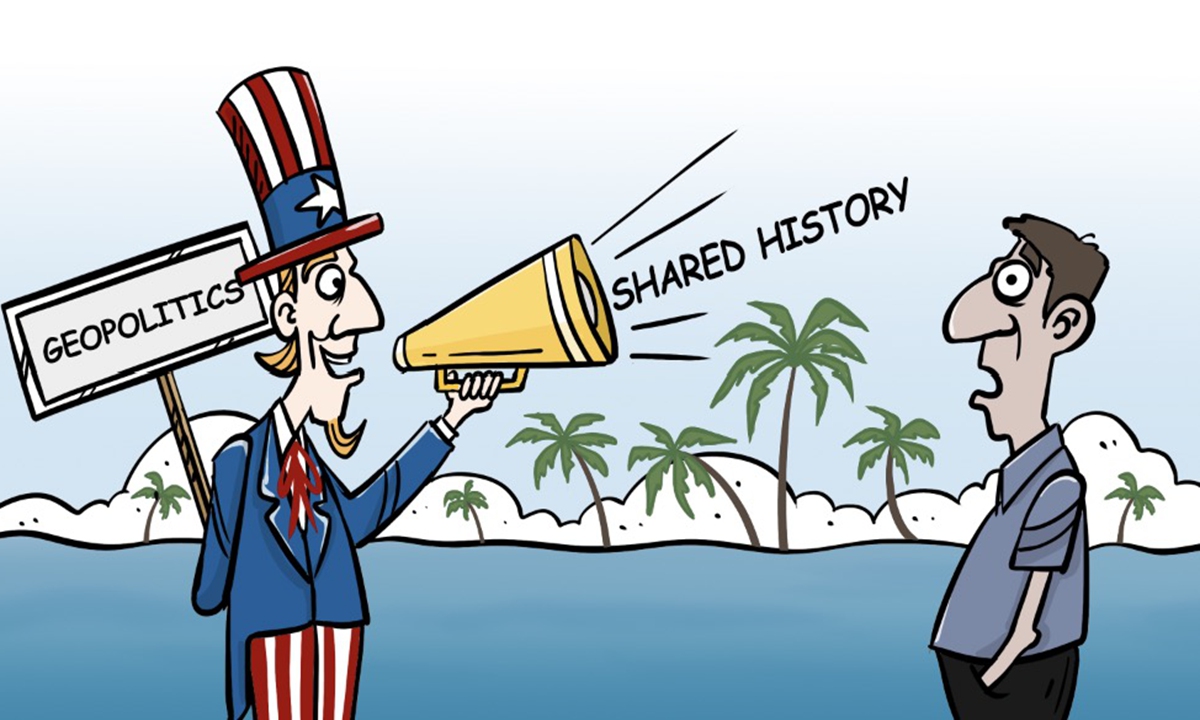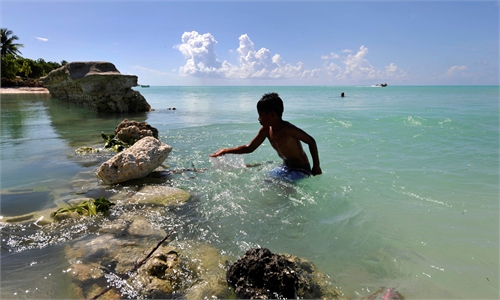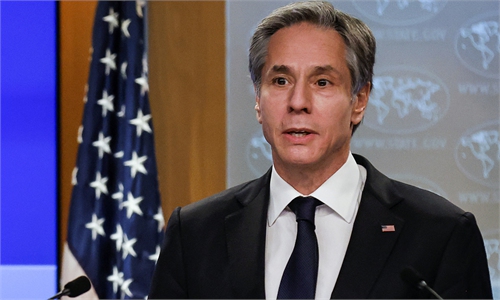
Illustration: Chen Xia/GT
As Pacific leaders departed Washington after the first ever and probably the last US-Pacific Leaders' Summit, there is little doubt, they would be asking themselves what it all truly meant.
They might be asking, for example, why after eight decades of neglect, the US has suddenly appeared on the horizon and decided to re-engage with tiny nations that dotted the vast expanse of the Pacific Ocean.
And why now?
There might be other searching questions as well - questions on climate change, questions on economic development, questions on infrastructure development and still more questions on educational opportunities and whether the "US is back" policy is truly in the best interest of Pacific Island nations and its growing population.
The two-day US-Pacific Leaders' Summit on September 28-29 got off to a bad start. A large chunk of independent sovereign nations and Territories in the Pacific - Cook Islands, Niue, New Caledonia and French Polynesia, never got an invite to the Summit, despite all being members of the Pacific Islands Forum.
It was a bitter pill for some to swallow. But that is not all.
To rub salt into their wounds, the Secretary General of the Suva-based Pacific Islands Forum Secretariat, Henry Puna, was also left out in the cold. Repeated appeals to Washington to reconsider its decision were simply ignored.
Angry leaders may use this outright rejection by Washington as a yardstick in measuring how much the US values, if at all, the Pacific and its people. For them, this is a departure from the Pacific Way, which defines for them the strategy of sticking together through thick and thin in order to survive.
It would appear these questions have helped remove layer upon layer of what defines the US interest in the Pacific.
In an article published on September 26 in the US government funded Australian Strategic Policy Institute (ASPI), Graeme Dobell wrote, "The summit on Wednesday and Thursday is a statement that the US can no longer leave Melanesia and Polynesia to Australia and New Zealand. That division of responsibilities worked well over 50 years. No more."
"'The United States now finds itself having to address long years of relative neglect,' observes former Australian diplomat Richard Maude. US interests are largely defined by China's gains. In this century, the global balance will be set in the Indo-Pacific, and that makes the South Pacific part of the great geostrategic struggle. At the summit, the South Pacific can sample the view and feel the weight that accompanies a new reality," according to Dobell.
But Washington would be foolish to lean heavily on symbolism as it is the case here. Symbolism no longer matters in this day and age despite Washington's view which no doubt pointed to its relationship with Pacific Island nations - a relationship underpinned by shared history, values, and people-to-people ties as Dobell had pointed out.
What is certain to harden Pacific perception against Washington's attitude is the fact that survival matters to the Pacific people. And in the minds of many Pacific leaders remains this searching question: why is the US leading the anti-China campaign when all Beijing is doing is to help lift the peoples of the Pacific region out of poverty.
A media executive from Tonga put it this way, the foreign media bashing of China after Beijing and Honiara signed a security agreement was totally unfair.
Solomon Islands journalist, Dorothy Wickham, a staunch supporter of the West, made this point well in her opinion piece published by the New York Times. She offers a simple lesson for the US as it vies with China for influence across the Pacific:
"You have got to show up. And the United States has not," she said.
"We get it. The Solomon Islands is small, remote and economically insignificant. But if all countries like us are dismissed as such, China will pick us off one by one with its promises of business projects and development aid.
"For decades, we identified with the West, a legacy forged when the United States, Australia and their allies halted Japan's imperial advance during World War II in the Battle of Guadalcanal. But that was long ago. There is a creeping sense today that we are being ignored, if not forgotten. So, who can blame us if we open the door to new friends who can help with our needs? And those needs are great."
If there any lessons to be learned, it is simply this: The US must be reminded that time has changed and needs have outgrown available resources.
In the case of the Solomon Islands, its annual population growth is an additional 20,000 extra mouths to feed every year.
China has proven its worth since September 2019, when it and Solomon Islands have established diplomatic relations. Since then, China has injected some SBD5 billion in grants targeting infrastructure facilities, education in terms of scholarships and the development of a new hospital aimed at improving services at the Solomon Islands National Referral Hospital in Honiara.
Beijing has promised to do more, including targeting the rural Solomon Islands.
By comparison, the US promised Malaita Province $25 million grants to address forestry, fisheries and agriculture. Three years after the package was announced, not a single grant has been paid to any of the farmers who applied for funding under the five-year program.
In a nutshell, redeeming Pacific confidence in Washington will take some time. One only hopes it does not take another century for the US to remember the Pacific and its people.
The author is Chief of Staff of the Solomon Star, the largest selling and oldest newspaper in Solomon Islands. opinion@globaltimes.com.cn



